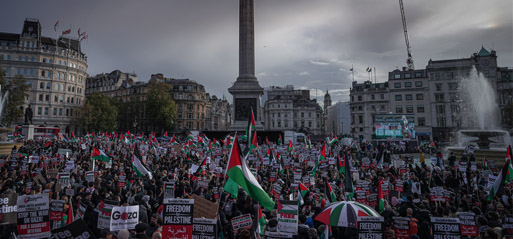
Elham Asaad Buaras
Israeli public uncertainty about victory in Gaza mirrors its allies growing concerns over the country’s rapidly declining international reputation, as highlighted in recent polls both domestically and globally. A survey from Israel’s national broadcaster KAN News and the Kantar Institute shows that a significant portion of Israelis either believe their country has lost the war against Hamas or are unsure of the outcome. Only 27% feel Israel has secured victory, while 35% think the war is lost, and 38% remain undecided. This uncertainty cuts across political lines, with 47% of coalition voters believing Israel has triumphed, compared to 48% of opposition voters who feel the country has lost.
The poll also highlights widespread reluctance to live in the Gaza envelope area after the war. Only 14 per cent of respondents would consider relocating to southern communities near Gaza, while 86 per cent outright reject the idea, reflecting deep fears over long-term security and stability in the region.
This doubt at home is compounded by anxieties on the global stage, where Israel’s international standing and reputation continue to take a hit as the conflict rages and spreads. Key allies warn that the damage to Israel’s standing could be long-lasting, if not permanent. National Public Radio (NPR) obtained a US State Department memo, revealing the Biden administration’s concerns that Israel may be making a “major strategic error” by underestimating the long-term consequences of its military actions in Gaza on its global image.
Assistant Secretary of State Bill Russo, head of global public affairs at the State Department, conveyed these concerns to Israeli officials during a call on March 13. According to a US readout of the conversation, both Israel and the U.S. are now facing “major credibility problems” due to Israel’s military offensive, which has drawn widespread international criticism. The memo states that “the Israelis seemed oblivious to the fact that they are facing major, possibly generational damage to their reputation not just in the region but elsewhere in the world.” It further warns that failing to address this reputational damage could be a “major strategic error,” with consequences that may endure for years.
There were early signs of this growing rift between Israel and its Western allies. Global support for Israel has plummeted since the war began. According to a poll by business intelligence firm Morning Consult, Israel’s net favourability—the difference between positive and negative views—dropped by an average of 18.5 percentage points globally from September to December, declining in 42 of the 43 countries surveyed.
The shift is most stark in nations like China, South Africa, and Brazil, which have all shifted from viewing Israel positively to negatively. In wealthier nations with already critical views of Israel, such as Japan, South Korea, and the U.K., the drop has been even more dramatic. Japan’s net favourability rating fell from -39.9 to -62.0, South Korea’s plummeted from -5.5 to -47.8, and the UK’s dropped from -17.1 to -29.8.
Sonnet Frisbie, deputy head of political intelligence at Morning Consult, summarised the findings: “The data shows just how tough of a road Israel has right now in the international community.”
The reputational damage to Israel and its allies has been most visible at the United Nations, where several ceasefire proposals, supported by most of the U.N. Security Council’s permanent members, were repeatedly blocked by the U.S. The American vetoes were justified by what the US saw as insufficient condemnation of Hamas or a failure to include demands for the release of Israeli hostages.
However, as the conflict drags on and reports of escalating death tolls, widespread destruction, and looming famine in Gaza become harder to ignore, support for Israel’s military actions is fading—even in countries where backing was previously strong. A Gallup poll in March showed a significant shift in American opinion: where a narrow majority had approved Israel’s actions in November (50% approval to 45% disapproval), the tide had turned, with only 36% approving and 55% now disapproving. While the largest decline in support occurred among Democrats, Republicans and Independents also showed declining approval.
Disapproval of Israel goes beyond concerns about its conduct in Gaza. Earlier this month, Israel faced even more backlash after it fired on positions of the UN peacekeepers in Lebanon, UNIFIL, with the second such incident unfolding on October 11 in the latest escalation. UN peacekeepers reported that Israeli fire on their headquarters in south Lebanon on October 10 left two Blue Helmets injured, sparking condemnation from European members of the mission. Israel claimed it was targeting Hezbollah militants near UN posts following the peacekeeping mission’s rejection of Israeli demands to “relocate” from some of its positions. The force stated, “This morning, two peacekeepers were injured after an IDF Merkava tank fired its weapon toward an observation tower at UNIFIL’s headquarters in Naqura, directly hitting it and causing them to fall.” Fortunately, while the two peacekeepers did not suffer serious injuries, they remain in the hospital.
The sharp decline in Israel’s global standing, coupled with the uncertainty and fear within the country, presents a daunting challenge as Israel navigates both the ongoing conflict and its potential long-term diplomatic fallout.
READ MORE
GAZA RELATED COVERAGE
Top story: Muslim American voters: Key to swinging the presidential election?
Editorial: Israel’s atrocities unmask West’s grotesque inhumanity toward non-Europeans
Vote for third-party candidates, scholars urge Muslim Americans
Suspended MP claims Labour colleagues stay silent on government’s Israel support out of job fears
More than 100 Muslim Labour councillors demand arms embargo on Israel
US health workers estimate death toll in Gaza is 119,000
x-Biden officials launch PAC to challenge US stance on Gaza
Anti-Zionist beliefs are ‘worthy of respect’, declares UK tribunal in landmark ruling
Pulitzer winner rejects prestigious award in solidarity with Palestine